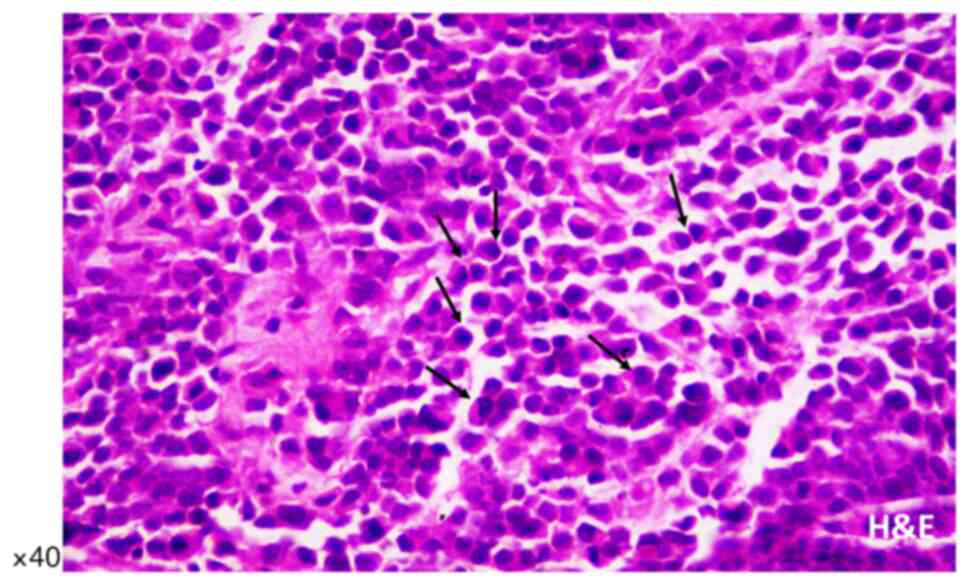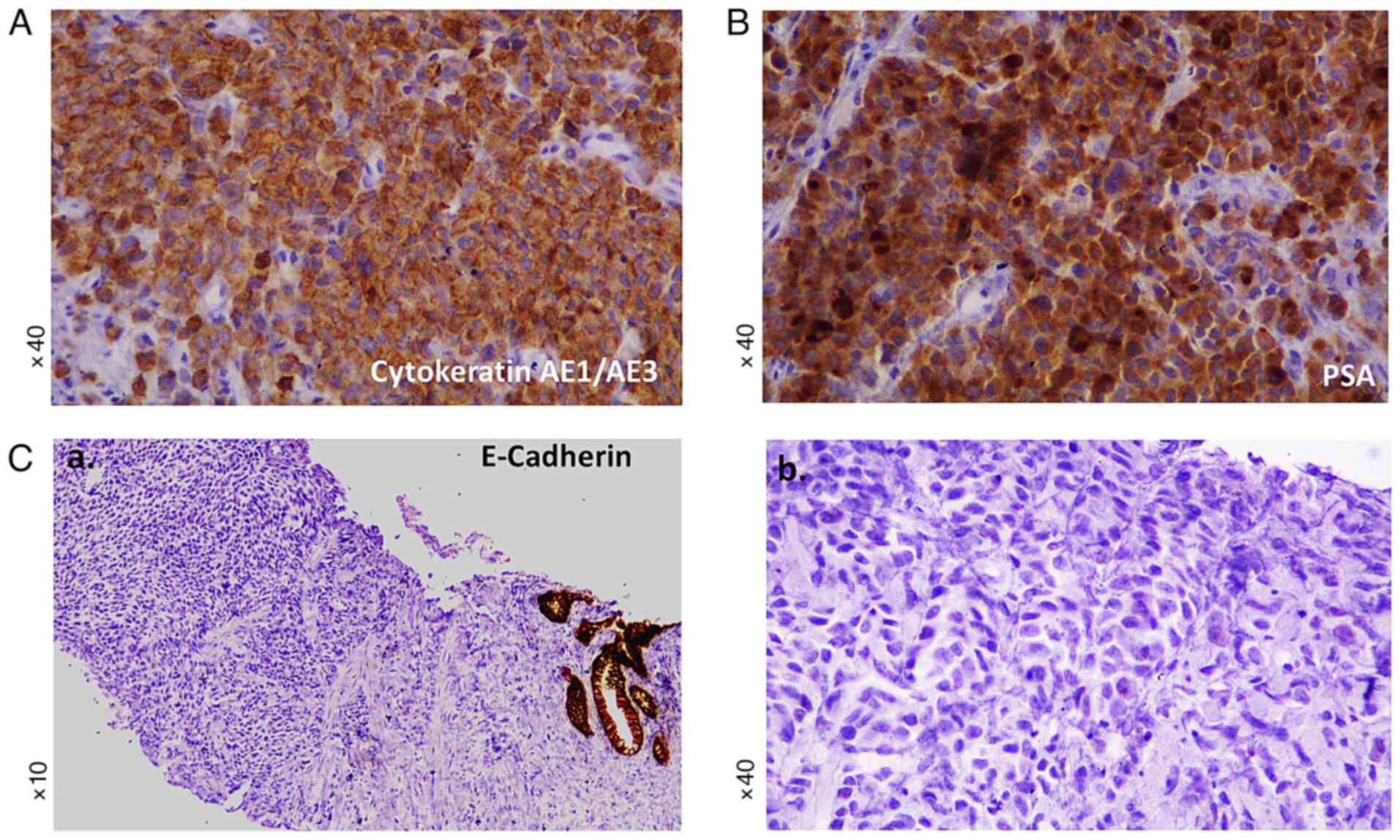|
1
|
Sung H, Ferlay J, Siegel RL, Laversanne M,
Soerjomataram I, Jemal A and Bray F: Global cancer statistics 2020:
GLOBOCAN estimates of incidence and mortality worldwide for 36
cancers in 185 countries. CA Cancer J Clin. 71:209–249.
2021.PubMed/NCBI View Article : Google Scholar
|
|
2
|
Baade PD, Youlden DR and Krnjacki LJ:
International epidemiology of prostate cancer: Geographical
distribution and secular trends. Mol Nutr Food Res. 53:171–184.
2009.PubMed/NCBI View Article : Google Scholar
|
|
3
|
Humphrey PA: Histopathology of prostate
cancer. Cold Spring Harb Perspect Med. 7(a030411)2017.PubMed/NCBI View Article : Google Scholar
|
|
4
|
Kweldam CF, van Leenders GJ and van der
Kwast T: Grading of prostate cancer: A work in progress.
Histopathology. 74:146–160. 2019.PubMed/NCBI View Article : Google Scholar
|
|
5
|
Lopez-Beltran A, Requena MJ, Montironi R,
Blanca A and Cheng L: Plasmacytoid urothelial carcinoma of the
bladder. Hum Pathol. 40:1023–1028. 2009.PubMed/NCBI View Article : Google Scholar
|
|
6
|
Fox MD, Xiao L, Zhang M, Kamat AM,
Siefker-Radtke A, Zhang L, Dinney CP, Czerniak B and Guo CC:
Plasmacytoid urothelial carcinoma of the urinary bladder: A
clinicopathologic and immunohistochemical analysis of 49 cases. Am
J Clin Pathol. 147:500–506. 2017.PubMed/NCBI View Article : Google Scholar
|
|
7
|
Cockerill PA, Cheville JC, Boorjian SA,
Blackburne A, Thapa P, Tarrell RF and Frank I: Outcomes following
radical cystectomy for plasmacytoid urothelial carcinoma: Defining
the need for improved local cancer control. Urology. 102:143–147.
2017.PubMed/NCBI View Article : Google Scholar
|
|
8
|
Al-Hussain T, Haffner MC, Altaweel WM and
Epstein JI: Plasmacytoid acinar adenocarcinoma of the prostate: A
newly described variant of prostate cancer. Hum Pathol. 94:86–91.
2019.PubMed/NCBI View Article : Google Scholar
|
|
9
|
Nguyen JK, Chen YY, Magi-Galluzzi C and
McKenney JK: Clinicopathological study of Gleason pattern 5
prostatic adenocarcinoma with ‘single-cell’ growth reveal 2
distinct types, one with ‘plasmacytoid ‘features. Am J Pathol.
44:1635–1642. 2020.PubMed/NCBI View Article : Google Scholar
|
|
10
|
Li Q, Assel M, Benfante NE, Pietzak EJ,
Herr HW, Donat M, Cha EK, Donahue TF, Bochner BH and Dalbagni G:
The impact of plasmacytoid variant histology on the survival of
patients with urothelial carcinoma of bladder after radical
cystectomy. Eur Urol Focus. 5:104–108. 2019.PubMed/NCBI View Article : Google Scholar
|
|
11
|
Dayyani F, Czerniak BA, Sircar K, Munsell
MF, Millikan RE, Dinney CP and Siefker-Radtke AO: Plasmacytoid
urothelial carcinoma, a chemosensitive cancer with poor prognosis,
and peritoneal carcinomatosis. J Urol. 189:1656–1661.
2013.PubMed/NCBI View Article : Google Scholar
|
|
12
|
Ericson KJ, Thomas L and Lee BH:
Plasmacytoid variant urothelial carcinoma: Clinicopathologic
outcomes and experience with neoadjuvant chemotherapy. J Clin
Oncol. 37(483)2019.
|
|
13
|
Diamantopoulos LN, Khaki AR, Vakar-Lopez
F, Tretiakova MS, Gore JL, Schade GR, Psutka SP, Hsieh AC, Lee JK,
Hsieh AC, et al: Patient (pt) characteristics, treatment patterns,
outcomes and prognostic factors in plasmacytoid urothelial
carcinoma (PUC). J Clin Oncol. 37 (Suppl 15):e16007. 2019.
|
|
14
|
Straccia P, Martini M, Sacco E, Bassi PF
and Pierconti F: Cytological features of micropapillary and
plasmacytoid variants of urothelial carcinoma. Diagn Cytopathol.
48:111–117. 2020.PubMed/NCBI View
Article : Google Scholar
|
|
15
|
Jibril A and Steven AC: Plasmacytoid
urothelial carcinoma of ureter with retroperitoneal metastasis: A
case report. Am J Case Rep. 19:158–162. 2018.PubMed/NCBI View Article : Google Scholar
|
|
16
|
Takada-Owada A, Nozawa Y, Onozaki M, Noda
S, Jamiyan T, Tokura Y, Nakazato Y, Kamai T and Ishida K:
Plasmacytoid urothelial carcinoma of renal pelvis with positive
zinc finger E-box-binding homeobox 1: A case report. Diagn Pathol.
15(124)2020.PubMed/NCBI View Article : Google Scholar
|
|
17
|
Keck B, Wach S, Kunath F, Bertz S, Taubert
H, Lehmann J, Stöckle M, Wullich B and Hartmann A: Nuclear
E-cadherin expression is associated with the loss of membranous
E-cadherin, plasmacytoid differentiation and reduced overall
survival in urothelial carcinoma of the bladder. Ann Surg Oncol.
20:2440–2445. 2013.PubMed/NCBI View Article : Google Scholar
|
|
18
|
Lim MG, Adsay NV, Grignon DJ and Osunkoya
AO: E-cadherin expression in plasmacytoid, signet ring cell and
micropapillary variants of urothelial carcinoma: Comparison with
usual-type high-grade urothelial carcinoma. Mod Pathol. 24:241–247.
2011.PubMed/NCBI View Article : Google Scholar
|
|
19
|
Ma B, Khazali A, Shao H, Jiang Y and Wells
A: Expression of E-cadherin and specific CXCR3 isoforms impact each
other in prostate cancer. Cell Commun Signal.
17(164)2019.PubMed/NCBI View Article : Google Scholar
|
|
20
|
Sangoi AR, Chan E, Stohr BA and Kunju LP:
Invasive plasmacytoid urothelial carcinoma: A comparative study of
E-cadherin and P120 catenin. Hum Pathol. 102:54–59. 2020.PubMed/NCBI View Article : Google Scholar
|
|
21
|
Palsgrove DN, Taheri D, Springer SU, Cowan
M, Guner G, Rodriguez MA, Pena MDC, Wang Y, Kinde I, Ricardo BFP,
et al: Targeted sequencing of plasmacytoid urothelial carcinoma
reveals frequent TERT promoter mutations. Hum Pathol. 85:1–9.
2019.PubMed/NCBI View Article : Google Scholar
|
|
22
|
Mohler JL, Antonarakis ES, Armstrong AJ,
D'Amico AV, Davis BJ, Dorff T, Eastham JA, Enke CA, Farrington TA,
Higano CS, et al: Prostate cancer version 2.2019, NCCN clinical
practise guidelines in oncology. J Natl Compr Canc Netw.
17:479–505. 2019.PubMed/NCBI View Article : Google Scholar
|
|
23
|
Nelson RS and Epstein JI: 1996. Prostatic
carcinoma with abundant xanthomatous cytoplasm. Foamy gland
carcinoma. Am J Surg Pathol. 20:419–426. 1996.PubMed/NCBI View Article : Google Scholar
|
|
24
|
Cina SJ and Epstein JI: Adenocarcinoma of
the prostate with atrophic feature. Am J Surg Pathol. 21:289–295.
1997.PubMed/NCBI View Article : Google Scholar
|
|
25
|
Humphrey PA, Kaleem Z, Swanson PE and
Vollmer RT: Pseudohyperplastic prostatic adenocarcinoma. Am J Surg
Pathol. 22:1239–1246. 1998.PubMed/NCBI View Article : Google Scholar
|
|
26
|
Wolf AN and Epstein JI: Pseudohyperplastic
prostatic adenocarcinoma in needle biopsy and simple prostatectomy.
Am J Surg Pathol. 24:1039–1046. 2000.PubMed/NCBI View Article : Google Scholar
|
|
27
|
Yaskiv O, Cao D and Humphrey PA:
Microcystic adenocarcinoma of the prostate: A variant of
pseudohyperplastic and atrophic patterns. Am J Surg Pathol.
34:556–561. 2010.PubMed/NCBI View Article : Google Scholar
|
|
28
|
Levi AW and Epstein JI: Pseudohyperplastic
prostatic adenocarcinoma in needle biopsy and simple prostatectomy.
Am J Surg Pathol. 24:1039–1046. 2000.PubMed/NCBI View Article : Google Scholar
|
|
29
|
Lopez-Beltran A, Eble JN and Bostwick DG:
Pleomorphic giant cell carcinoma of the prostate. Arch Pathol Lab
Med. 129:683–685. 2005.PubMed/NCBI View Article : Google Scholar
|
|
30
|
Parwani AV, Herawi M and Epstein JI:
Pleomorphic giant cell adenocarcinoma of the prostate: Report of 6
cases. Am J Surg Pathol. 30:1254–1259. 2006.PubMed/NCBI View Article : Google Scholar
|
|
31
|
Hansel DE and Epstein JI: Sarcomatoid
carcinoma of the prostate: A study of 42 cases. Am J Surg Pathol.
30:1316–1321. 2006.PubMed/NCBI View Article : Google Scholar
|
|
32
|
Epstein JI, Amin MB, Reuter VE and
Humphrey PA: Contemporary gleason grading of prostatic carcinoma:
An update with discussion of practical issues to implement the 2014
international society of urological pathology (ISUP) consensus
conference on gleason grading of prostatic carcinoma. Am J Surg
Pathol. 41:e1–e7. 2017.PubMed/NCBI View Article : Google Scholar
|
|
33
|
Humphrey PA: Variants of acinar
adenocarcinoma of the prostate mimicking benign conditions. Mod
Pathol. 31 (S1):S64–S70. 2018.PubMed/NCBI View Article : Google Scholar
|
|
34
|
Gottipati S, Warncke J, Vollmer R and
Humphrey PA: Usual and unusual histologic patterns of high Gleason
score 8 to 10 adenocarcinoma of the prostate in needle biopsy
tissue. Am J Surg Pathol. 36:900–907. 2012.PubMed/NCBI View Article : Google Scholar
|
|
35
|
Epstein JI, Egevad L, Amin MB, Delahunt B,
Srigley JR and Humphrey PA: Grading Committee. The 2014
international society of urological pathology (ISUP) consensus
conference on gleason grading of prostatic carcinoma: Definition of
grading patterns and proposal for a new grading system. Am J Surg
Pathol. 40:244–252. 2016.PubMed/NCBI View Article : Google Scholar
|
|
36
|
Al-Ahmadie HA, Iyer G, Lee BH, Scott SN,
Mehra R, Bagrodia A, Jordan EJ, Gao SP, Ramirez R, Cha EK, et al:
Frequent somatic CDH1 loss-of-function mutations in plasmacytoid
variant bladder cancer. Nat Genet. 48:356–358. 2016.PubMed/NCBI View
Article : Google Scholar
|
|
37
|
Schrader KA, Masciari S, Boyd N, Wiyrick
S, Kaurah P, Senz J, Burke W, Lynch HT, Garber JE and Huntsman DG:
Hereditary diffuse gastric cancer: Association with lobular breast
cancer. Fam Cancer. 7:73–82. 2008.PubMed/NCBI View Article : Google Scholar
|
|
38
|
Oliveira C, Senz J, Kaurah P, Pinheiro H,
Sanges R, Haegert A, Corso G, Schouten J, Fitzgerald R, Vogelsang
H, et al: Germline CDH1 deletions in hereditary diffuse gastric
cancer families. Hum Mol Genet. 18:1545–1555. 2009.PubMed/NCBI View Article : Google Scholar
|
|
39
|
Keller G, Vogelsang H, Becker I, Hutter J,
Ott K, Candidus S, Grundei T, Becker KF, Mueller J, Siewert JR and
Höfler H: Diffuse type gastric and lobular breast carcinoma in a
familial gastric cancer patient with an E-cadherin germline
mutation. Am J Pathol. 155:337–342. 1999.PubMed/NCBI View Article : Google Scholar
|
|
40
|
Sahin AA, Myhre M, Ro JY, Sneige N,
Dekmezian RH and Ayala AG: Plasmacytoid transitional cell
carcinoma. Report of a case with initial presentation mimicking
multiple myeloma. Acta Cytol. 35:277–280. 1991.PubMed/NCBI
|
|
41
|
Coyne JD and Sim E: Urothelial neoplasia
with plasmacytoid morphology. Histopathology. 48:200–201.
2006.PubMed/NCBI View Article : Google Scholar
|
|
42
|
Wang YG, Perera M and Gleeson J:
Plasmacytoid urothelial carcinoma of the bladder with extensive
scrotal wall invasion. Urol Ann. 8:381–383. 2016.PubMed/NCBI View Article : Google Scholar
|
|
43
|
Fritsche HM, Burger M, Denzinger S, Legal
W, Goebell PJ and Hartmann A: Plasmacytoid urothelial carcinoma of
the bladder: Histological and clinical features of 5 cases. J Urol.
180:1923–1927. 2008.PubMed/NCBI View Article : Google Scholar
|
|
44
|
Bougen NM, Amiry N, Yuan Y, Kong XJ,
Pandey V, Vidal LJ, Perry JK, Zhu T and Lobie PE: Trefoil factor 1
suppression of E-CADHERIN enhances prostate carcinoma cell
invasiveness and metastasis. Cancer Lett. 332:19–29.
2013.PubMed/NCBI View Article : Google Scholar
|
|
45
|
Nauseef JT and Henry MD:
Epithelial-to-mesenchymal transition in prostate cancer: Paradigm
or puzzle? Nat Rev Urol. 8:428–439. 2011.PubMed/NCBI View Article : Google Scholar
|
|
46
|
Lee HM, Hwang KA and Choi KC: Diverse
pathways of epithelial mesenchymal transition related with cancer
progression and metastasis and potential effects of endocrine
disrupting chemicals on epithelial mesenchymal transition process.
Mol Cell Endocrinol. 457:103–113. 2017.PubMed/NCBI View Article : Google Scholar
|
|
47
|
Chunthapong J, Seftor EA, Khalkhali-Ellis
Z, Seftor RE, Amir S, Lubaroff DM, Heidger PM Jr and Hendrix MJ:
Dual roles of E-cadherin in prostate cancer invasion. J Cell
Biochem. 91:649–661. 2004.PubMed/NCBI View Article : Google Scholar
|
|
48
|
Epstein JI: Prostate cancer grading: A
contemporary photomontage. Am J Surg Pathol. 40(137)2016.PubMed/NCBI View Article : Google Scholar
|
|
49
|
Epstein JI, Egevad L, Humphrey PA and
Montironi R: Members of the ISUP Immunohistochemistry In Diagnostic
Urologic Pathology Group. Best practices recommendations in the
application of immunohistochemistry in the prostate: Report from
the international society of urologic pathology consensus
conference. Am J Surg Pathol. 38:e6–e19. 2014.PubMed/NCBI View Article : Google Scholar
|
|
50
|
Dehm SM and Tindall DJ: Molecular
regulation of androgen action in prostate cancer. J Cell Biochem.
99:333–344. 2006.PubMed/NCBI View Article : Google Scholar
|
|
51
|
Zhang X, Zhang Z, Chen S, Jiang J, Qi R,
Mi X, Zhang X, Xi Y, Zheng H and Hua B: Prognostic significance of
E-cadherin expression in prostatic carcinoma: A protocol for
systematic review and meta-analysis. Medicine (Baltimore).
99(e19707)2020.PubMed/NCBI View Article : Google Scholar
|
















